Two days ago I woke up at 3:45AM to head to the airport. As a professional musician, I’ve seen 3:45 on the end of my day much more often in my life than I’ve seen it on the beginning, and I’m not much of a morning person. But this felt important.
The KKK had a rally planned on the courthouse steps on Saturday. They had promised that it would be the largest rally they had held in years. Some said 1,000 white supremacists would gather. Some said “thousands.” This was in response to the Memphis City Council’s decision to rename Forrest park, which was named after the Civil War general, slave trader and first Grand Wizard of the KKK.
I was catching a flight to Memphis to meet up with some local activists at an event designed to raise other voices in that conversation about race and equality at the People’s Conference on Race & Equality. My good friend Frank Kelly picked me up at the airport and spent the day with me, getting me where I needed to go and even pitching in on selling a few White Flour books at the conference while I was busy talking with folks. Good guy, that Frank.
 The last time the Klan rallied in Memphis, in 1998, there were dozens of arrests and some minor injuries. This time, the police presence was huge, the counter protesters were kept far away, and mounted police and a SWAT van even blocked the view between the two. The Klansmen apparently brought a malfunctioning bullhorn which didn’t carry their message much farther than the end of the steps. From the area reserved for counter-protestors, reached only after traveling down a long alley lined with police in full riot gear, there was nothing at all to hear, and the only view of the KKK was a few flags and pointy hats poking up above a fence two blocks away.
The last time the Klan rallied in Memphis, in 1998, there were dozens of arrests and some minor injuries. This time, the police presence was huge, the counter protesters were kept far away, and mounted police and a SWAT van even blocked the view between the two. The Klansmen apparently brought a malfunctioning bullhorn which didn’t carry their message much farther than the end of the steps. From the area reserved for counter-protestors, reached only after traveling down a long alley lined with police in full riot gear, there was nothing at all to hear, and the only view of the KKK was a few flags and pointy hats poking up above a fence two blocks away.
To be honest, I didn’t rejoice in the denial of audience to the Klan by the local government quite as much as you might think I would. For the authorities to engineer this is quite different from a grassroots effort to produce the same effect, such as the ‘angels’ that block the view of anti-gay protesters at some events, or the brilliant freeze-out staged by the town of Davidson, NC in response to a Klan rally in 1986. Justice means having the same rules for everyone, and in looking at something like this, we have to consider the precedent it sets as well as the individual case.
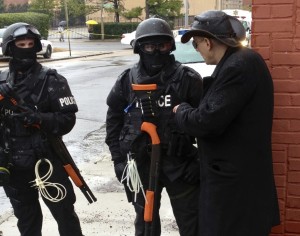 So as glad as I am that the Klan’s message went largely unheard, I’m concerned that the same tactics could be applied in other situations, when the causes being represented might be more just, but equally unpalatable to the authorities. Still, this is complicated stuff, and I would not have wanted the job of deciding how to respond to this on behalf of the city. In the end, I’m glad there was no physical violence, and I guess I will cautiously cut the city some slack for their over-zealous response.
So as glad as I am that the Klan’s message went largely unheard, I’m concerned that the same tactics could be applied in other situations, when the causes being represented might be more just, but equally unpalatable to the authorities. Still, this is complicated stuff, and I would not have wanted the job of deciding how to respond to this on behalf of the city. In the end, I’m glad there was no physical violence, and I guess I will cautiously cut the city some slack for their over-zealous response.
As it turned out, the weather wasn’t conducive to racist rallies, and the Klansmen only mustered 61 people. To be fair, they lived up to their billing in one regard: that still qualified it as one of their larger rallies in years, as most of their rallies these days consist of just a few people. Many of us were grateful for the rain. It may well have done as much to prevent violence as the large numbers of well-armed law enforcement.
And though I am clear that it was important to speak out, I have to ask myself whether it was important to speak out across the street from the KKK. In the end, I think it may have been much more effective to do exactly what Memphis United did.
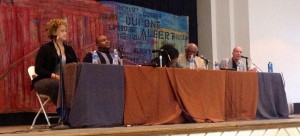 Their People’s Conference on Race & Equality sported the tagline, “Learn to confront hate by building community,” which they did through breakout workshops like the one pictured here, panel discussions and meetings designed to educate, connect and inspire individuals and organizations “individuals and organizations collaboratively committed to the peaceful, critical, and strategic pursuit of a just and loving Memphis.” I was asked to speak as part of a panel on “Race, Faith and Movements,” and I thoroughly enjoyed that conversation and others I got to have that day.
Their People’s Conference on Race & Equality sported the tagline, “Learn to confront hate by building community,” which they did through breakout workshops like the one pictured here, panel discussions and meetings designed to educate, connect and inspire individuals and organizations “individuals and organizations collaboratively committed to the peaceful, critical, and strategic pursuit of a just and loving Memphis.” I was asked to speak as part of a panel on “Race, Faith and Movements,” and I thoroughly enjoyed that conversation and others I got to have that day.
Among several fascinating people I met at the conference, one sticks out. Scott Shepherd had seen that I was coming to town and dropped a note to see if we could catch up while I was there. It was a dense day, and we didn’t have as much time to talk as I would have liked, but I was moved by his story, and by his courageous choice to heal.
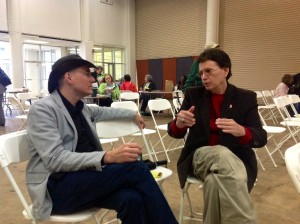 Scott is a former Klansman, and spent many years immersed in that movement and culture. He appeared on national talk shows arguing for white supremacy, and knew most of the leaders of the movement personally. After an arrest for DUI and an illegal gun in his car, he ended up in a residential addiction treatment program. Working through that experience, he did some serious soul searching, and also came to know and care about some friends who were going through similar struggles right beside him, but whose skin was darker than his own.
Scott is a former Klansman, and spent many years immersed in that movement and culture. He appeared on national talk shows arguing for white supremacy, and knew most of the leaders of the movement personally. After an arrest for DUI and an illegal gun in his car, he ended up in a residential addiction treatment program. Working through that experience, he did some serious soul searching, and also came to know and care about some friends who were going through similar struggles right beside him, but whose skin was darker than his own.
He came out a different man, and now speaks to youth about his experiences, trying to keep people from being caught up in the seduction of ‘belonging’ that often leads people into dubious activities like gangs and white supremacist movements. Scott kept a low profile at the conference, just being there, listening, and spending time in casual conversations. To my eye, it seemed like it was healing for him just to be there.
And he wasn’t the only one. I was nourished by being in the company of all of these good people as well, and I think that goes beyond my own need to belong. The work of building community is a lot less dramatic, and a lot more effective in the long run, than the work of tearing down ideas we oppose, and these folks were doing that important work well.
That’s not to say that there aren’t times to stand up in opposition of what’s wrong. There certainly are. We sometimes need to do so in order to defend each other and ourselves from hateful ideas, which all too easily become oppressive actions (though I feel strongly that we should always do that creatively and in a spirit of love, rather than meeting hatred with more hatred, or violence with more violence).
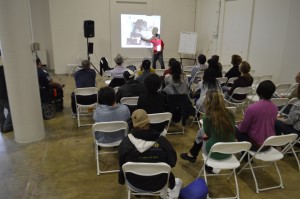 In the end, the best defense against bigotry is forging communities that are strong enough to withstand it. Really knowing each other is the starting place for healing all of our wounds. Learning each other’s stories and struggles leads to a broader sense of who ‘us’ is, and there is no victory over ‘them’ so complete, or so healing, or so effective, as welcoming them into ‘us.’ That is the radical subversion of fear by love.
In the end, the best defense against bigotry is forging communities that are strong enough to withstand it. Really knowing each other is the starting place for healing all of our wounds. Learning each other’s stories and struggles leads to a broader sense of who ‘us’ is, and there is no victory over ‘them’ so complete, or so healing, or so effective, as welcoming them into ‘us.’ That is the radical subversion of fear by love.
Here’s the takeaway for me: the Klan has gone home. They gathered for a couple of hours, talked to each other, shouted through their ineffectual bullhorn, then drove away. Whatever minor significance for their cause their gathering may have had, it is already dissipating.
The local community activists who gathered to do the work of improving their city, on the other hand, are still there. And they’ll be there tomorrow and next week and next month and next year. They have nourished and strengthened and educated each other. They know each other a bit better than they did last week, and may know who to call when a particular gift is needed in a particular effort. They are a bit more of a community than they were before.
Frank dropped me back at the Memphis airport about 5:30PM. I spent less than 9 hours in Memphis on Saturday, and I had very little to do with the good things that happened there, but I was glad to see a vibrant community of activists lift each other up and do the work. I left inspired and encouraged, in spite of the harsh catalyst that led to this gathering. I hope I offered some encouragement as well.
Rev. King said “the arc of history is long, but it bends toward justice.” Community building is a long slow process of steady, unrelenting pressure, but together, we push steadily. And this is how we bend the arc.
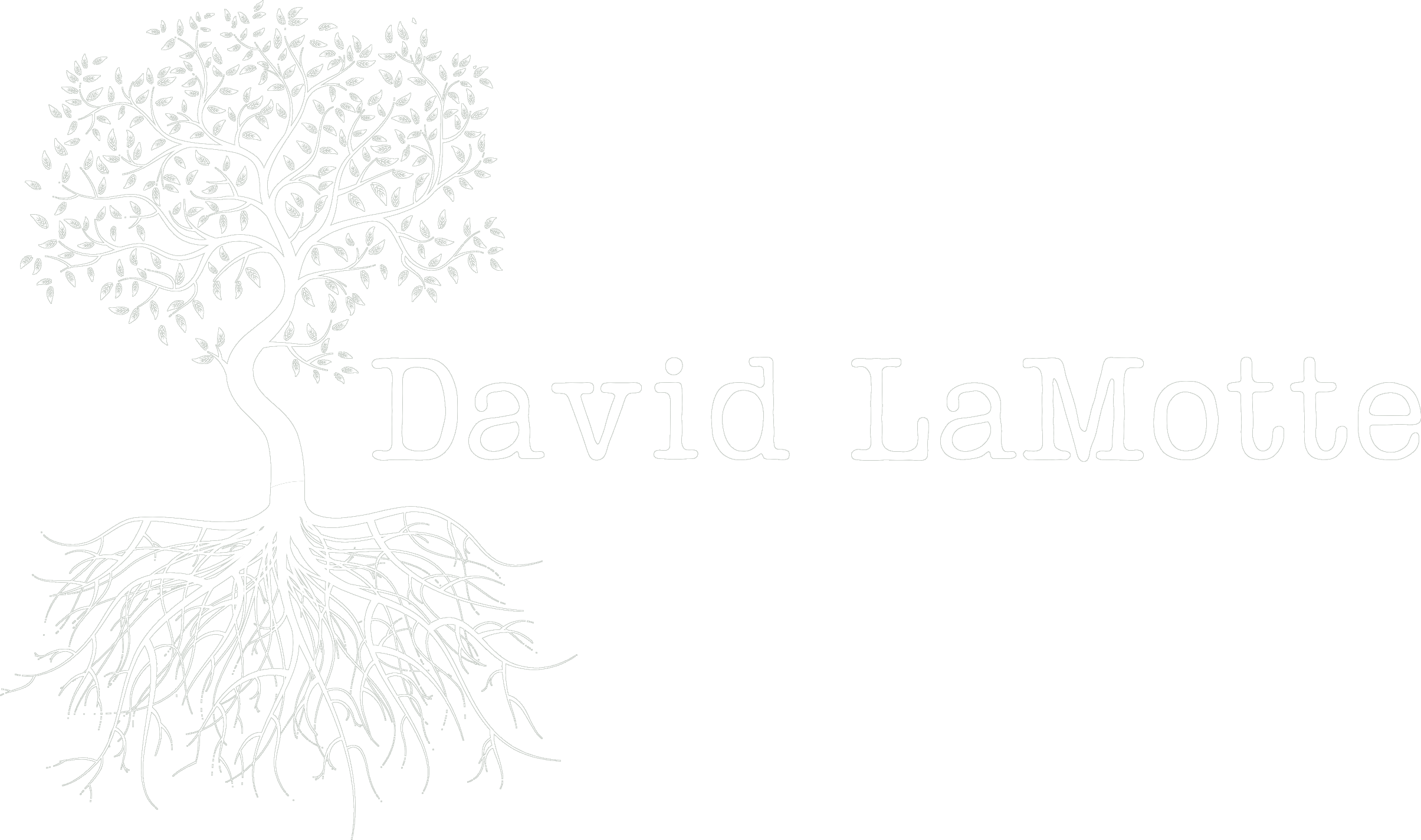
I have to agree with Lindsey and David, Shephard showed a lot of courage to look at himself and see the truth. I praise him and also you David. Shephard and you are two that give us all hope.
Suz
Thanks so much. I’m a big fan of Scott’s. 😉
Have really liked what I have read on your website and blogs. The KKK is an awful group of people. I was impressed with the Shepard man. That takes courage beyond anything I can describe.
Hi Lindsey, thanks for your kindness. As for the KKK, I like to think of them as misguided people who do awful things, rather than as awful people. Scott Shephard, after all, was one of them for quite a while, and he has become a friend of mine. I’m with you, regarding his courage. Thanks again for stopping by here.
I’m just getting acquainted with you, your music and your life of peacemaking . Ann Russ posted information about your concert at 1st Presbyterian in Argenta (North Little Rock)on our Episcopal Peace Fellowship of Arkansas Facebook Page. Thanks for coming to share your talent and your wisdom.
Hi Caroline, thanks for spending the time to look around. I look forward to meeting you soon in Little Rock. Peace.